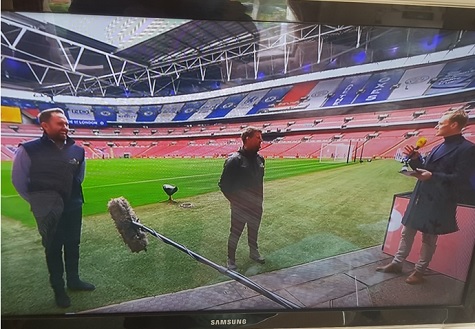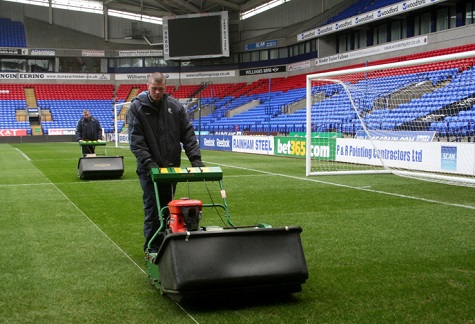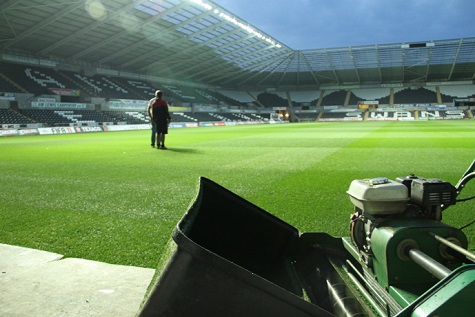I would firstly like to say a big congratulations to Leicester City for winning this year’s FA Cup at Wembley.
I really enjoyed watching the coverage of the match on the BBC, a great result for Leicester who are without doubt a special club to play for and belong to. Seeing those jubilant scenes when the owner came onto the pitch summed up the closeness of the club. This has been borne out with several conversations I have had with John Ledwidge, the club’s grounds manager who speaks very highly of the support received in what they do as a grounds team. I also enjoyed seeing the BBC interview Karl Standley, Wembley’s grounds manager on primetime TV. A great advert for our industry and what we all do.

A rewarding industry
I have said on more than one occasion, our wonderful turf grass and amenity sector is a very unique and rewarding industry to be working in. The scope and variety of work is wide-ranging and the opportunity to work anywhere in the world is astounding. Once you have acquired the basic fundamental skills of horticulture and groundsmanship, there is no end to the opportunities that are on offer within this ever changing global industry.
Just taking sports turf alone, look at all the different sports you could be working within - football, tennis, rugby, bowls, cricket, golf, horseracing, croquet and polo to name a few.
The vast skills sets you will acquire while working in any one of these sports sectors should set you up for life. I passionately believe it is important to have worked on the tools and used the vast array of machinery and resources on hand to give you the understanding of our industry.

Today’s modern turf professional needs to be a jack of all trades, encompassing many skills, with the ability to use all available aides and technologies to deliver the expectations of the demanding clients and owners. In essence they need to be a plant pathologist, mechanic, chemist, mathematician, IT literate, good communicator flexible and have good people skills.
You only have to attend one of our two annual trade industry shows, BTME or Saltex, to realise the extent and magnitude of this industry and what it can offer in terms of career prospects.
With hundreds of exhibitors promoting their wares and services, both of the shows clearly indicate the scope and opportunities we have available.
The range and type of career opportunities are endless, both home and abroad. There is a real diversity of job roles across all our major sports. We must also consider all the support, supplier, product and service jobs that serve our industry.
Recruitment difficulties
However, having said all that, last week I spoke to a few prominent professional grounds managers and head greenkeepers who all said they are struggling to recruit new staff. They are just not finding the quality of candidate they need for the positions they need to fill. For example, trying to find a first assistant greenkeeper is proving to be extremely difficult for some. Likewise, a number of other premier venues are also finding it hard to attract youngsters into the industry mainly due the fact they are expected to work weekends and evenings to accommodate matchdays, fixtures and club competitions.

These expectations have always been in our industry and many of us see it as part of the job and happy to do these hours to fulfil our career prospects. Not anymore though it seems. Many of the younger generation want and expect a lot more.
Today’s generation, known as Generation Z, those born after Millennials, includes individuals who were born between 1996 and 2004. Some say the generation actually extends to those born before 2012. This age group now populates the newest cohort of college students and young professionals who will shape the future of both higher education and the workforce, based on their experiences and how those experiences have shaped them.
At the same time, members of Generation Z should be aware of some weaknesses they might possess. For example, since they are such high achievers and crave opportunity, many members of Generation Z have high expectations for upward mobility in their careers that their employers might not be able to fulfil.

It is in my view, that these high expectations and the different work ethics, perhaps don’t bode well with attracting these young people into our industry.
Conditions must improve
Both pay and working conditions need to be vastly improved if we really want to attract any new blood. For far too long the pay scales in our industry are way too low and often many companies expect weekend work and overtime to be paid in lieu.
We all know that really doesn’t work. I know of many grounds professionals who work many long hours and rarely ever get their time back. One such greenkeeper I spoke to recently, is owed more than 300 hours! When on earth is he going to find the time to get that back?
As mentioned many times before, our industry does post recommended pay scales. Both the GMA and BIGGA have done so for many years. However, very few grounds professionals rarely get anywhere near their recommended scales of pay.
Low pay is one of the principal reasons why we cannot attract new blood into our industry. A white van driver can easily earn in excess of £24,000 whereas most, if not all, qualified ground professionals are earning considerably less. Smewhere between £18,000-£22,000 if they are lucky.
Also we are still, after all these years, still tarnished with the title of being merely grass cutters. A tag we are finding it hard to relinquish. We all know that this is not the case, but if there are two major challenges we need to address, these are the principle ones we must change in order to improve the standing of our industry.

I personally would like to invite a number of leading industry personalities to come and discuss these issues and find a collective way to improve our industry reputation on pay and conditions. I understand that there have been many organisations trying (BIGGA, GMA, Amenity Forum, Parks Management Forum. Perennial, RHS, APSE, BAGMA, R&A) to name a few. But as usual it is still a fragmented way of working.
A coming together of all these institutions, hopefully finding a national agreement on how we can improve and promote our industry, will be a key driver to ensure our future.
Attempting to do things in isolation will never work. Our industry has been fragmented for far too many years. It is time for change.
We should not rest on our laurels though. It is important we continue to inspire and recruit a new generation of grounds professionals to come and work in our industry - and more importantly, that they can learn from their peers.
We also need to ask ourselves, are our colleges and universities teaching the relevant skills and knowledge base to enable these newcomers to do the job that they have been employed for?
And crucially, paying a decent wage that is in line with other professional tradesmen.